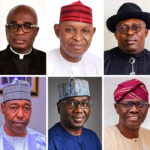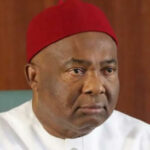
As the National Minimum Wage Committee meets next week, organised Labour is insisting that the implementation of the new wage must start next month, Okechukwu Nnodim, Gift Habib, and Abdulrahman Zakqriyau write
The Nigeria Labour Congress, on Thursday, said the new minimum wage for Nigerian workers would begin in April this year and that the Tripartite Committee on the National Minimum Wage would meet on March 27 and 28, 2024 to submit and deliberate on its zonal reports.
It was also gathered that the current N30,000 minimum wage expires this month, while the new one would take off from next month.
This came as state governors warned against unrealistic demands from Labour and urged the National Minimum Wage Committee to consider the capacities of states to pay the new minimum wage during the meeting on March 27 and 28, 2024.
But Labour insisted that the governors were unwilling to pay workers despite receiving bailouts, for instance, during the administration of former President Muhammadu Buhari,
They stressed that the payment of salaries was not charity, as workers work hard to earn their salaries.
Speaking with one of our correspondents on the March 27 and 28 meeting, the National President of the NLC, Joe Ajaero, said, “The zonal committees are submitting the reports of the public hearings on March 27, 2024.
“You know that after the public hearings, all that we have are the several zonal reports, so we will now bring them together to work on them before reaching agreements.”
He explained that the zonal committees would submit their reports to the Minimum Wage Committee “when we reconvene on March 27 and 28 with the reports from our various zones.
“From there we can now look at the various reports, deliberate on them, and do further consultations.”
Asked whether the implementation of the new minimum wage would start on April 20 as speculated in some quarters, Ajaero replied, “They don’t pay salaries on the 20th. The effective date for implementation is April. So if we finish (deliberations), they pay, but if we don’t finish, then they will pay arrears for that month.”
The Federal Government in January this year announced its plan to implement a new minimum wage to reflect the current economic realities.
The current national minimum wage is N30,000, which the labour unions have argued that it is no longer realistic, given the galloping inflation in Nigeria.
President Bola Tinubu, in his New Year broadcast, said his administration was committed to implementing a new minimum wage to give Nigerian workers an improved welfare.
The government subsequently set up a tripartite committee on January 30, 2024, to determine a new minimum wage.
The 37-man committee is chaired by the former Head of the Civil Service of the Federation, Goni Aji.
The committee had the terms of reference to ‘consult all stakeholders on the issue of national minimum wage and recommend a realistic and practical national minimum wage to the government.’
In furtherance of the assignment, a zonal public hearing was held simultaneously on March 7, 2024 in Lagos, Kano, Enugu, Akwa Ibom, Adamawa, and Abuja.
The NLC and the TUC in different states proposed various figures as a living wage, referencing the current economic crunch and the high costs of living.
In their different proposals on the minimum wage, the NLC asked the South-West states to pay N794,000 as the TUC mentioned N447,000.
At the North-Central zone hearing in Abuja, the workers demanded N709,000 as the new national minimum wage, while at the South-South, N850,000 minimum wage was demanded.
In the North-West, N485,000 was proposed, while the South-East stakeholders demanded N540,000 minimum wage.
When approached on Thursday to provide updates on the tripartite committee’s activities, another official with the NLC, who spoke on condition of anonymity due to lack of authority to speak on the matter, confirmed the position of the NLC president.
The source said, “There will be a meeting of the National Minimum Wage Committee on the 27th and 28th of this month inside the Villa and we expect that those reports will be submitted and acted upon. Other discussions will be furthered during the meetings and we hope that issues around the figures will receive greater attention.
“The implementation of the new minimum wage can only commence after it has been passed into law and we expect that the entire process which includes passage into law by the National Assembly would have been completed, at least by April 19, which is the day the existing new minimum wage would have expired. So that the new minimum wage will take off by the next day, being 20th of April, 2024.”
Recall that on December 1, 2023, The PUNCH exclusively reported that the Federal Government stated that a new minimum wage regime would come into effect on April 1, 2024.
The report stated that the Minister of Information and National Orientation, Idris Mohammed, disclosed this in an interview with The PUNCH in Abuja, and said the current N30,000 minimum wage would expire at the end of March 2024.
However, Labour unions argued that based on the country’s labour law, the minimum wage should be reviewed every five years.
Govs urge wage committee
The Nigeria Governors’ Forum has urged the National Minimum Wage Committee to take into account present circumstances, unique characteristics of individual states, and the resulting effects on both government and private sector employers’ ability to pay when determining the wage amount.
The Federal Government launched the tripartite committee in January to deliberate on the national minimum wage. Vice President Kashim Shettima inaugurated the 37-member panel at the Council Chamber of the State House in Abuja.
Comprising representatives from federal and state governments, the private sector, and organized labor, the committee’s mandate is to propose a revised national minimum wage for the nation.
Following consultations nationwide, workers have requested varying minimum wage rates across different geopolitical zones. As a result, the Federal Government Minimum Wage Panel has initiated the compilation of reports from public hearings conducted in various zones.
Reacting to this on Thursday, the NGF, in a communiqué issued at the conclusion of its virtual meeting, and signed by its Chairman, Kwara State Governor, AbdulRahman AbdulRasaq, emphasised the importance of incorporating state policing as a crucial amendment in the ongoing 1999 Constitutional Amendment process to address a fundamental flaw in the national security framework.
The communiqué read in part, “The forum commiserated with the Governor of Delta State, Sheriff Oborevwori, over the communal clash between Okuama in the Ughelli South Local Government Area and Okolaba in the Bomadi Local Government Area of Delta State, and which led to the death of many including 16 military personnel.
“While condemning the heinous act, members observed a minute of silence for the souls of the departed. Members reviewed the progress of the National Minimum Wage Committee and ongoing multi-stakeholder engagements towards agreeing on a fair minimum wage.
“Members urged the NMWC to consider the current realities, individual state peculiarities, and consequential impact on the capacity of the government as well as private sector employers to pay. Members also emphasised the need for proposals to be data-driven and evidence-based.
“The forum highlighted the need for state policing as a critical amendment in the ongoing 1999 Constitutional Amendment proceedings to correct a fundamental flaw in the national security architecture.”
The forum reviewed states’ advancement in implementing business-friendly reforms, such as enhancing land administration, fostering Public Private Partnerships, promoting investments, improving infrastructure, and refining regulatory environments through the World Bank’s State Action on Business Enabling Reforms Programme for Results.
It stated “Members discussed the growing concern raised by the United States Embassy over illegal and fraudulent inter-country adoption of Nigerian children by US citizens including systemic fraud and corruption, child-buying, the imprisonment of pregnant women, and unreliable or non-existent documentation.
“Members pledged to engage the relevant Ministries, Departments, and Agencies of government in a bid to address the situation.”
Govs unwilling to pay
Meanwhile, the NLC official who spoke on condition of anonymity because he was not authorised to speak on the issue, stated that governors were unwilling to pay workers’ salaries.
The source said, “The ability to pay has always been a factor in negotiating past minimum wage and will still be a factor in the current negotiation. We are talking of a wage that will be able to allow the workers to exist as humans and not as animals.
“This is because the survival of the worker is more important than any other factor, and any wage that would not allow the worker to survive is a starvation wage – a wage unto the death. That is why we insist on a living wage, which is also what the President promised Nigerian workers during his inaugural speech.”
He advised that governors and employers must be willing to pay the new wage to cushion the effects of the economic hardship on Nigerians.
“Governors and employers must be able to match the President and must exercise the willingness to pay decent wages to workers. It is not charity to pay salaries because workers’ pay is earned income and not handouts.
“We emphasise ‘willingness’ because we remember that the problem with workers’ salaries in Nigeria is not capacity to pay but the willingness to pay. We must remember that the former President doled out funds to state governors to pay salaries to workers but they ended up not paying after receiving the funds.
“It therefore tells you that the need is for those in government to demonstrate willingness, realising that workers are human beings like themselves who ought to meet their basic needs to themselves, families, and the society,” the NLC official stated.




